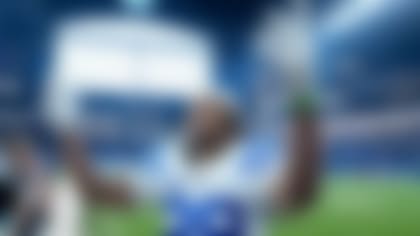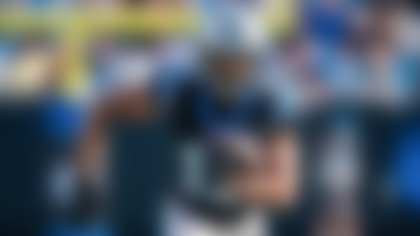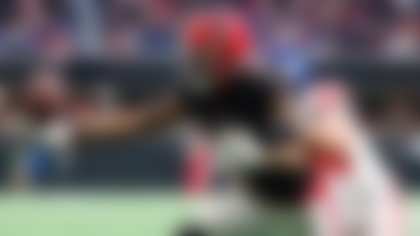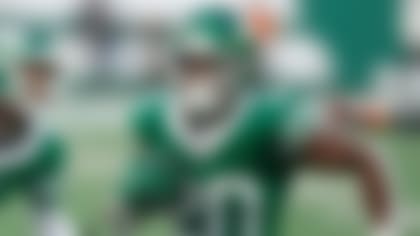You can't have a Super Bowl without hearing that someone has something to prove, even if that someone ranks as one of the most accomplished players in 撸先生AV history.
In February 2005, for instance, quarterback Tom Brady sat next to safety Rodney Harrison as the Patriots' team bus made its way to practice for Super Bowl XXXIX. The bus was largely quiet, but over the hum of the oversized tires against the road, Brady softly yet sternly reflected on how six quarterbacks and 198 players were drafted ahead of him in 2000.
It didn't matter that he already had two Super Bowl MVPs on his r茅sum茅 and was about to play for a third championship. Brady was still motivated to remind scouts and front office personnel that they missed the mark by allowing him to fall to the sixth round of the draft.
We hear it so often -- So-and-so is playing with a chip on his shoulder -- that it's hard not to wonder if the words are athlete-speak or something that has real impact on the field. Are they white noise or a legitimate motivational tool?
Dr. Corey Yeager doesn't hesitate to answer. A life coach and psychotherapist for the NBA's Detroit Pistons, Yeager also has worked with 撸先生AV players to help them thrive as people and, by extension, players.
"It is real," he said of using slights as motivation. "The realness is connected to this idea that we've all heard that perception is reality. From a young age, the athlete's mind is formed in a way that we're always looking for, listening for, feedback on our athletic abilities. As 7-year-olds, that's listening to dad after the game saying, 'You did really well against this kid, but this kid may be better.' There's always this feedback loop that athletes are looking for and receiving, particularly with social media and the different outlets."
The subject seems particularly pertinent as we near kickoff of Super Bowl LVII on Sunday in Glendale, Arizona, as both starting quarterbacks, Jalen Hurts and Patrick Mahomes, have acknowledged being confronted with significant challenges coming into the season.
For Philadelphia's Hurts, it was the call to prove he could be the Eagles' quarterback of the future as well as the present. Some labeled this a make-or-break year, contending the Eagles might use one of their two first-round draft choices in 2023 to acquire a replacement if he failed to take his game to the next level. Never mind that he moved into a starting role late in his rookie season and took the team to the playoffs in only his second year. The fact that he struggled in the postseason loss to the Buccaneers became the storyline for 2022. It was ammunition for those who said he never would make it as a QB1 after being drafted in the second round out of Oklahoma.
Hurts has acknowledged hearing the talk while consistently stiff-arming the notion that his MVP candidacy or 16-1 record this season was driven by doubters. Can that be true?
"If we're talking about the research, what we're discussing is the conceptualization of intrinsic and extrinsic motivation," Yeager said. "Are you motivated by external factors, or are you internally motivated? To this idea of slights as motivation, it is a melting pot of intrinsic and extrinsic motivation."
Meaning, extrinsic motivation largely comes from what others say or think about you. Intrinsic motivation is more personal. It comes from within. When players talk about no one being harder on them than they are on themselves, that's intrinsic motivation. Some might distill it to mean: an unwavering pursuit of greatness, as defined by the athlete, not others.
You see it in both Hurts and Mahomes, the decorated quarterback who will lead the Chiefs on Sunday. At 27 years old, he is driven to reach levels few have. He has won a league MVP, a Super Bowl MVP and is seeking his second championship in his third Super Bowl appearance over the past four years. That's the intrinsic motivation.
The extrinsic was the question about whether he could continue to flourish after losing big-play wideout Tyreek Hill in an offseason trade with Miami. In previous seasons, whenever a dynamic play had to be made, whenever a short pass needed to be taken for a long touchdown, the speedy Hill regularly came through for the Chiefs. But his departure caused some to openly act as if Mahomes needed to prove he could still be a transcendent talent.
In the "What have you done for me lately?" world of professional sports, you're only as good as your next pass, and Mahomes acknowledged as much last September, saying: "I always feel like I have something to prove. I'm just a guy from Texas Tech who they said couldn't play in the 撸先生AV."
"The psychology of the game is so critically important for the high-level athlete, because, looking at athletic ability, everyone's is high," Yeager said. "So these slights can be a motivating factor. It is very real, and it is that 'perception being reality' that is a key."
You can say he's got a chip on his shoulder, but I never had that. The most important thing was, you don't have to go out and show them; you have to go out and show yourself. Doug Williams
And yet, those slights are often forgotten when the games begin. Yeager and others contend that any slights, real or perceived, tend to help an athlete lock in during the lead-up to games, narrowing their focus in practice or raising their intensity in workouts. But once the game starts, muscle memory and training take over.
"I've worked with thousands of athletes in all sports, and drive is the big thing," said Graham Betchart, a mental skills coach with the NBA's Sacramento Kings. "It starts for a lot of people with, What are you against? People say you can't do this or you can't do that, and you respond to it. But at a certain level, it becomes, What are you with? not What are you against?
"It's like if you're on a surfboard, and instead of paddling against the wave, where you feel a resistance and say it's a great challenge, now you're going with the wave. You're going with the flow. When someone is in the zone, afterward they will tell you, 'There wasn't any resistance. I was just flowing. I wasn't thinking about anything.' That's our best performance. Chip on your shoulder -- it can get you to work out every day. But when we have our ultimate greatness, our best, no one ever says my best came out tonight because I was in total resistance and wanted to prove someone wrong. No, it was: I got into the zone, I got present, I was fully trusting and I got into a different dimension."
If any player ever had a reason to have a chip on his shoulder, it was Doug Williams. In 1978, he became the first Black quarterback to be drafted in the first round, going 17th overall to the Buccaneers. But he never got the respect or the salary he deserved in his early years, which forced him to jump to the USFL.
In many respects, he carried the weight of not only his team on his shoulders, but also his race. He would sit at his locker after a loss with Tampa Bay and reflect on what had just happened and what was going to be said in the public, aware that how he did could have a direct impact on whether Black quarterbacks coming up behind him would get a fair shot.
And yet, Williams said he never played with a chip on his shoulder. And in his mind, there really is no reason for either Hurts or Mahomes to do it, though he understands the narrative.
"I can see where Jalen was a little upset by not getting drafted in the first round, or people saying he was more athletic than a quarterback," Williams said. "You can say he's got a chip on his shoulder, but I never had that. The most important thing was, you don't have to go out and show them; you have to go out and show yourself.
"What Jalen has done is probably reinvent himself from his first two years at Alabama. The people who were saying that about Jalen watched him early on in his career, but they don't give him no credit for transferring to Oklahoma, where he did everything that Baker Mayfield and Kyler Murray have done. The last couple of years, you can see how much he has transformed himself. His throwing motion has improved and he stands in the pocket. You got a guy who finished the season with only one loss, and it's not because of his running ability solely. And if you drop back and stand in the pocket like he does, you've got to be able to read defenses. That in itself tells you this kid is in the Super Bowl because he's as good as any quarterback in this league."
And Mahomes?
"There shouldn't be a chip on his shoulder," Williams said, chuckling. "Somebody needs to put a weight on him to try to hold him down. He's been doing it for five years. Everything that he has done has created something that, as a quarterback, you have not seen before in this league. Aaron Rodgers was the closest thing to Patrick Mahomes as far as arm talent and how he can maneuver his arm and his quick thinking."
Williams laughed a bit harder. For him, he's not concerned about motivations. His focus is on something larger: this being the first Super Bowl with two Black starting quarterbacks.
Williams was part of the first regular-season game that featured starting quarterbacks who happened to be Black, when his Bucs faced off against Vince Evans and the Bears in 1979. Eight seasons later, he became the first Black quarterback to both start and win a Super Bowl, earning game MVP honors after guiding Washington to a 42-10 throttling of John Elway's Broncos. Williams threw four touchdown passes in a single quarter during that championship triumph, finishing with 340 yards passing in the game. For him, this Sunday's showdown is a momentous occasion.
"I was sitting in the basement watching the Cincinnati-Kansas City game, and to say that I wasn't pulling for Patrick -- I was," he said, noting that Hurts had advanced to the Super Bowl earlier in the day. "I love the way (Bengals QB) Joe Burrow plays, but I had to pull for Patrick. When the Chiefs kicked the field goal, emotion came through my body. My eyes got watery, but I didn't let no tears fall. I was emotional. For about five minutes, I just sat there. All by myself.
"My wife heard me scream to the top of my voice. 'Yes! Yes!' I did that for me, for what I've been through, what Shack (Harris) has been through. For Marlin Briscoe. David Mays. Warren Moon. Randall Cunningham. For what all of us went through. A lot of people won't understand that. They don't even know what you've been through, and it's hard to really just sit there and tell somebody. If you tell them, you almost have to get into that racism thing, and you don't want to do that. You want to try to keep as much positive as you can."
Listen to Mahomes and Hurts long enough this week, and you realize that their motivation for Sunday is not to prove anyone wrong, or themselves right. It is to do what they are intrinsically wired to do: chase greatness. And if they can do it while honoring the men who paved the road for them, men such as Williams and Briscoe and Harris, all the better.
Follow on Twitter.












